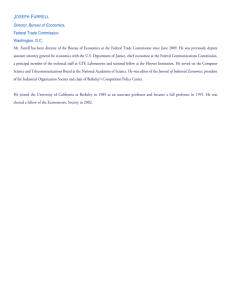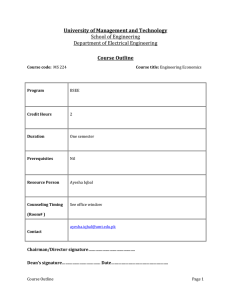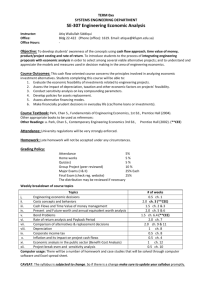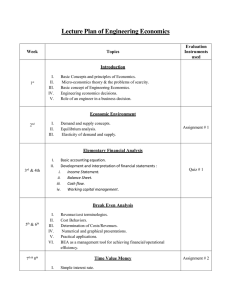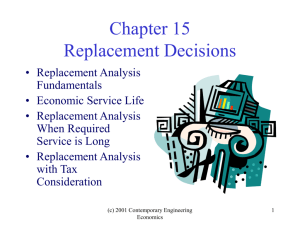CIVL 395--ENGINEERING ECONOMICS AND DECISION THEORY
advertisement
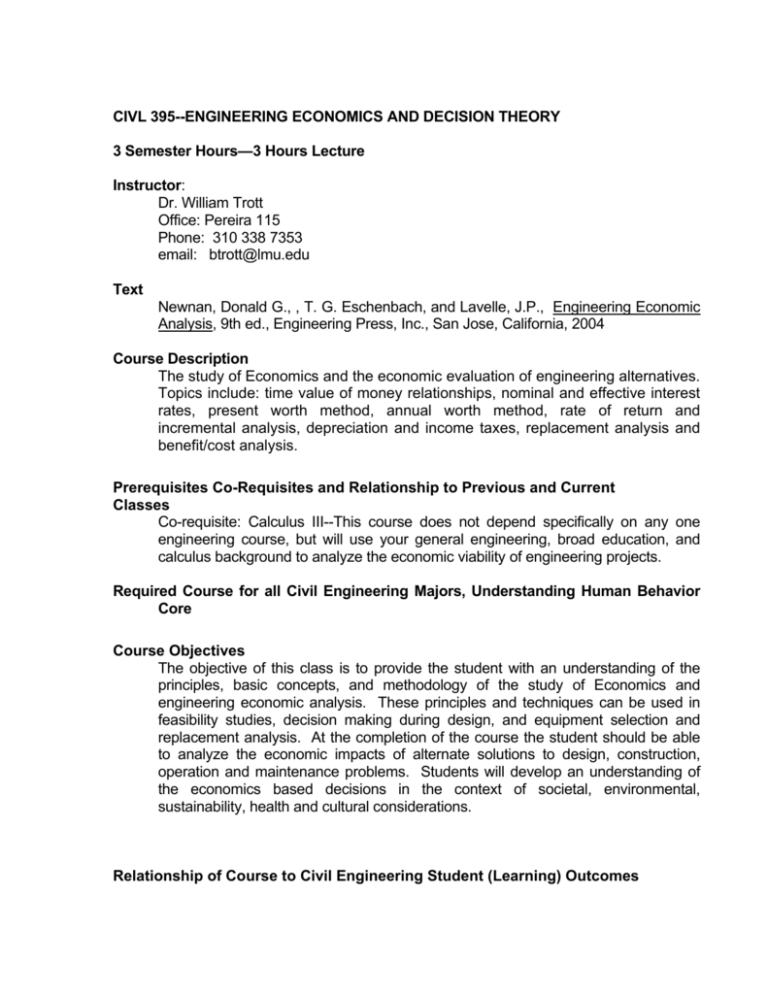
CIVL 395--ENGINEERING ECONOMICS AND DECISION THEORY 3 Semester Hours—3 Hours Lecture Instructor: Dr. William Trott Office: Pereira 115 Phone: 310 338 7353 email: btrott@lmu.edu Text Newnan, Donald G., , T. G. Eschenbach, and Lavelle, J.P., Engineering Economic Analysis, 9th ed., Engineering Press, Inc., San Jose, California, 2004 Course Description The study of Economics and the economic evaluation of engineering alternatives. Topics include: time value of money relationships, nominal and effective interest rates, present worth method, annual worth method, rate of return and incremental analysis, depreciation and income taxes, replacement analysis and benefit/cost analysis. Prerequisites Co-Requisites and Relationship to Previous and Current Classes Co-requisite: Calculus III--This course does not depend specifically on any one engineering course, but will use your general engineering, broad education, and calculus background to analyze the economic viability of engineering projects. Required Course for all Civil Engineering Majors, Understanding Human Behavior Core Course Objectives The objective of this class is to provide the student with an understanding of the principles, basic concepts, and methodology of the study of Economics and engineering economic analysis. These principles and techniques can be used in feasibility studies, decision making during design, and equipment selection and replacement analysis. At the completion of the course the student should be able to analyze the economic impacts of alternate solutions to design, construction, operation and maintenance problems. Students will develop an understanding of the economics based decisions in the context of societal, environmental, sustainability, health and cultural considerations. Relationship of Course to Civil Engineering Student (Learning) Outcomes - - - An ability to apply knowledge of mathematics, science and engineering (a) An ability to design a system, component or process to meet desired needs with realistic constraints such as economic, environmental, social, health and safety, manufacturing and sustainability (c) An ability to identify, formulate and solve engineering problems (e) The broad education necessary to understand the impact of engineering solutions in a global, economic, environmental and societal context. Students will be able to comprehend the impact of a project on the environment, cultural resources, utilities and/or the community (h) An ability to use the techniques, skills and modern engineering tools necessary for engineering practice. (k) Additional Understanding Human Behavior Core Learning Outcome ‐Students will understand the general study of Economics and its methods in its context as a social science. Topics Covered Context of the topic of Economics with respect to the social sciences, humanities and engineering Economics and other considerations when making decisions Microeconomics, demand and supply; cost concepts, profit maximization (4 classes) Basic Accounting principles, balance sheet, income statements (1 class) Time value of money, cash flow equivalence, and interest factors; (6 classes) Present worth analysis; (3 classes) Annual worth analysis; (2 classes) Rate of return and incremental analysis; (3 classes) External rate of return; (2 classes) Benefit cost ratio method; (2 classes) Sensitivity and breakeven analysis; (2 classes) Depreciation methods; (2 classes) Income tax considerations; (3 classes) Replacement analysis; (2 classes) Risk and uncertainty; (2 classes) Market failures, benefit cost analysis in the public sector (4 classes) Exams; (3 classes)





